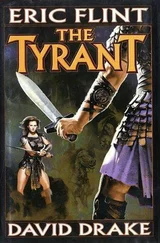“There will need to be a new Lord Marshal. And quickly. The men are going to be disheartened by … by Lord Ternigan’s duplicity.”
“He was corrupted,” Basrahip said. “Turned against you, Prince Geder.”
“The Timzinae,” Geder said. “It’s their desperation.”
“As you say, Prince Geder,” Basrahip said mournfully.
“If you would like,” Daskellin said, “I can draw up a list of men who would make good generals for the kingdom, and we can—”
“No,” Geder said, rounding on him. “No. I am done with giving power over to generals and counselors and great men. Do you see what’s happened when I’ve done that? They turn. They all turn. I don’t want any more generals.”
His chest was working like a bellows, and his face felt hot even in the winter wind. Canl Daskellin nodded as if what he’d said made perfect sense, then paused and held out his open hand, the palm up like he was offering something.
“What do you want?” he asked, and his voice was gentle, calm, and polite. To judge from it, they might have been sitting leather couches in the Fraternity of the Great Bear rather than standing over the corpse of the Lord Marshal in the mud of a half-conquered battlefield. “If not generals to lead the armies or counselors, then who do you want?”
A friend , Geder thought. I want a friend.
Are you certain you won’t come with us?” Daskellin asked. “There is still time to catch up with the hunt if we join them at Masonhalm.”
“No,” Geder said. “You go on ahead. I’ll join you before the hunt’s over. Only not yet.”
Night made the gates of Kiaria more foreboding. The few fires that guttered in the camps seemed small in the face of the mountain that loomed above them, and the sky that rose above that. A half moon spilled its milky light over the valley. Dragons had been here once. Had fought here. Had built a massive fortress against each other that now the last remnant of their race had fled to. It made sense if the Timzinae truly weren’t humans that they would fall back to the old defenses, the old strategies. It was the size of the thing that overwhelmed him. The war between the goddess and the dragons stretched back farther than history, and now he was supposed to end it. He was surrounded by false friends and duplicity, conspiracy and violence, and he was the one who was going to lead the world to peace? It seemed impossible.
But still, he had to try. What would they say about him if he didn’t?
“This is still hostile country,” Daskellin said.
“I have guards.”
“Guards can be overwhelmed,” Daskellin said. “If you must go south, take a real force of soldiers with you.”
“They have to keep the siege.”
“There’s enough,” Daskellin said. “Nothing of substance is going to happen here before the new Lord Marshal comes.”
Geder leaned back in his chair. A falling star streaked through the sky, bloomed briefly, and was gone. A servant came and quietly spirited away the remnants of their dinner.
“All right,” Geder said. “If it will make you happy.”
“Thank you,” Daskellin said. “Who do you think sent those letters?”
“I don’t know,” Geder said. “But whoever it was, they didn’t have to. It’s something to have an ally, even if I don’t know who they are as yet.”
“Well. That’s one way to look at it, I suppose,” Daskellin said.
Geder felt the urge to ask what he meant by that, but the effort seemed too much. The violence of the day was weighing on him, and he knew he wouldn’t sleep. Or not easily, at least.
“I think it’s time I retire for the night,” Geder said, drawing himself up. His fingers were numb and his nose was running from the chill. And the army had been keeping its place out here for months. Geder knew it was uncharitable of him, but he couldn’t help being grateful that he got to leave while they stayed on. But at least the cold had frozen the mud. He took a few steps, then paused and looked back.
“Thank you,” he said.
“You are always welcome,” Daskellin said. “Would it be rude to ask what exactly you were thanking me for?”
Geder shrugged.
“Not betraying me, I suppose.”
Inside the warmth and comfort of the tent that had recently been Ternigan’s, Geder called for paper and pen and sent for a courier. The servants brought him blankets and pillows and a butter lamp with a tall flame that filled the room with the scent of smoke. For a long time, he stared at the page, uncertain how to proceed.
Cithrin—
I know you have not written back to me, and I understand. You’re busy, and I am too. But I am weary, my love. I am tired to my bones, and I find I need the company of someone who cares for me. Someone I can trust. I am writing you now from the siege camp at Kiaria, but in the morning I will begin on my way south to Suddapal and, my dear, to you.
Cithrin
Neither Komme Medean nor Pyk Usterhall made any mention of Isadau or of the steady stream of refugees that Cithrin helped flee from Suddapal. The only overt sign that anything about the operations of the bank had changed was the name to which the bank reports were addressed. Without any formal acknowledgment, they simply began to act as if Cithrin were the voice of the Medean bank in Suddapal, and so it became true. It was like a cunning man turning water to wine or a stone to an orange. She was transformed by the act of their collective will.
Still, there were some details in the ciphered reports that carried more implications than others. Pyk Usterhall’s report listed a significant capital outlay for commiserative gifts, which technically meant additional payments from insurance policies that covered deaths but was also the common euphemism for bribes. Komme also recommended that all branches call in loans made to the Free Cities, Borja, and Northcoast, and that they avoid making any loans into those territories without extraordinary returns. Cithrin didn’t know whether the lives of people displaced by war fell under the heading of extraordinary returns, but thought they might.
From a financial perspective, her own reports back were the collapse of an incompetent. The branch was losing money like a slaughterhouse pig bled. Ships hired for unspecified cargo. Caravan masters employed for half a dozen off-season trips into the Keshet. Cithrin gave out loans on almost any pretext with expectation of repayment to other branches and no way to track the borrower.
Which is to say that the bank’s mechanism had reversed. What had been an engine designed for the accumulation of wealth had become a system for wealth’s application. She could imagine herself as some sort of half-divine fairy changing the world where she wished to by the careful dispensation of gold and silver, contracts and letters of credit. The difference she made was measured not in weights of precious metal, but in some number of lives and in children living outside of prisons. And she could go on with this until the coffers ran dry, and even past that, working on deficit until even the reputation of the Medean bank wasn’t enough to keep her boards from being broken.
Some nights, she would stay up late and try to calculate her efficiency. How many hundred refugees had fled danger under her watch, and how much she had spent to do it. It occurred to her more than once that the Antean Empire had placed a low price on Timzinae lives, and that she had been the one in position to buy. Those were the best nights. The worst, she thought of other things.
The logic of the world had been inverted. Cheap lives were good. Money was there to be lost. Even the opportunities that came to her were suspect.
Idon’t think it’s a good idea,” Cithrin said, shaking her head at the list of names on the page before her. “Look at these. Tamar Sol. She’s that old woman who lives beside the trading house, isn’t she?”
Читать дальше










